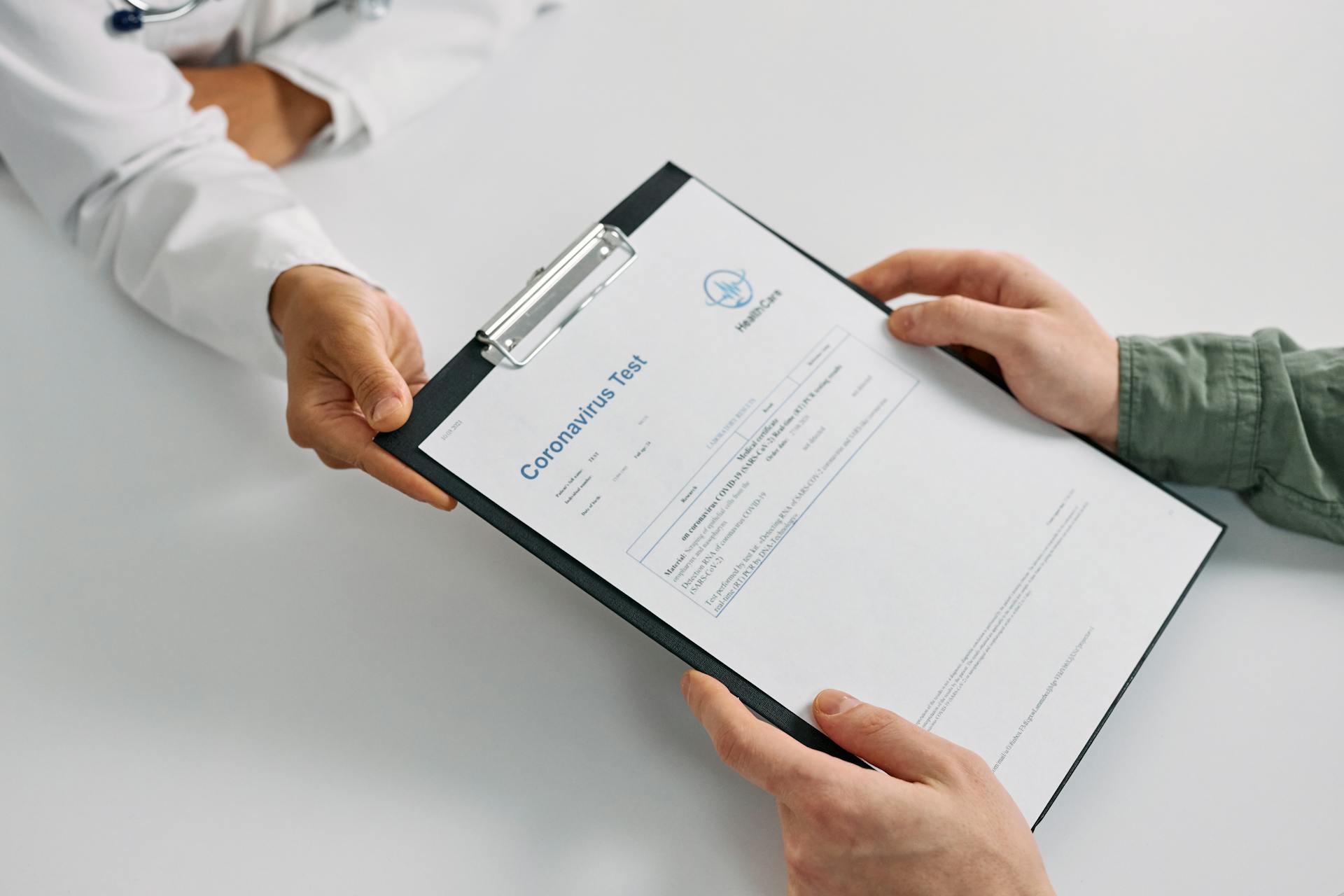
Negotiating medical bills can be a daunting task, but it's often a necessary step in avoiding financial stress. A staggering 66% of people who receive medical bills experience financial stress as a result.
Many hospitals and medical facilities are willing to work with patients to reduce their bills. In fact, a study found that 75% of medical bills were reduced or waived after negotiation.
To start the negotiation process, gather all relevant medical records and bills. This will help you identify any errors or discrepancies on your bill, which can be used as a bargaining chip.
Worth a look: Financial Aid for Medical Bills
Understanding Your Bill
You got your medical bill and now it's time to understand what it's all about. 80% of medical bills contain errors or overcharges, so be sure to review it carefully.
First, check the billing statement for accuracy. Your patient account number, claim number, and health insurance ID number should be included. Make sure these numbers match your records.

Look for a detailed breakdown of charges, if not, ask for it. You want to see each charge itemized, so you can review each one. A payment you made for a previously billed charge may not have been recorded until after the new bill with additional charges was sent.
Check for duplicate billing, incorrect codes, and charges for canceled procedures or services. You can request copies of your medical records from the hospital to verify dates of service, billing codes, and procedures. This will help you identify any errors.
A billed charge is not the same as the amount owed after insurance. Don't pay a medical bill until you receive the final bill, which shows the total amount due after insurance has paid or declined to pay the claim.
Discover more: How to Bill Medical Insurance for Dental Procedures
Reducing Your Bill
You can negotiate your medical bill to make it more manageable. Around 80% of medical bills contain errors or overcharges, so it's essential to review your bill carefully.
Worth a look: Can You Make Monthly Payments on Medical Bills
Request an itemized bill from your healthcare provider to ensure each charge is accurate. This will help you identify any duplicate billing, incorrect codes, or charges for canceled procedures or services.
Medical billing advocates can help you review your bill, dispute errors, and negotiate a lower bill. They often charge a percentage of the amount saved or an hourly rate ranging from $75 to $350.
Before paying your bill, verify that the charges are correct and the billing codes match the services you received. You can also research the average cost of medical procedures in your area to ensure you're being billed fairly.
If you still owe the bill, consider negotiating it down to an amount you can afford or ask if the provider will accept an interest-free repayment plan. Some nonprofit organizations also provide financial help for medical expenses and prescription drugs.
Consider reading: Help with Medical Bills Colorado
Negotiating with Insurance
As you navigate the complex world of medical bills, it's essential to know that you have a neutral party on your side. The hospital patient advocate can assist with many issues, including obtaining copies of your medical records.

You can start by meeting with the hospital patient advocate, a neutral party who can help you understand and deal with hospital bills and insurance. They may also provide information about available hospital financial assistance programs.
The patient advocate can help you review your hospital bills and identify any errors or discrepancies. They can also assist with communicating with insurance companies to resolve billing issues.
By working with the patient advocate, you can gain a better understanding of your hospital bills and insurance coverage. This can help you make informed decisions about your care and finances.
A unique perspective: Can a Hospital Sue You for Medical Bills
Verify Itemized Bill
Around 80% of medical bills contain errors or overcharges, so it's crucial to review the itemized bill carefully.
Never pay a medical bill that doesn't itemize each charge. This includes charges for procedures, services, and office visits.
Make sure each item on the itemized bill is one that you actually owe, as medical billing errors are common.
If the doctor or hospital sends a bill that isn't itemized, request that they send you an itemized bill for your review.
A payment you made for a previously billed charge may not have been recorded until after the new bill with additional charges was sent, so be sure to check for this.
You can look up the average cost of medical procedures for your city or region on sites such as Healthcare Bluebook or FAIR Health to make sure you're being billed fairly.
Ask for Assistance
You have insurance, but there are certain expenses that aren't covered, and the remaining amount is more than you can afford right now.
Don't be afraid to ask for help - many hospitals and medical providers have financial assistance programs in place. Some may even offer discounts or payment plans to make your medical bills more manageable.
You can start by contacting the billing department of the hospital or medical provider and explaining your situation. They may be able to offer you a payment plan that works for you.
Some hospitals and medical providers may also offer charity care or sliding scale fees, which can significantly reduce your medical bills. These programs are usually based on your income and family size.
Curious to learn more? Check out: What Is the Minimum Monthly Payment on Medical Bills
Paying Your Bill
You must pay all your medical bills unless you challenge them and win. If you can't pay the bill, here are some resources and tips to try.
If you can scrounge up the cash, offering a lump sum payment for a reasonable percentage of what you owe is a great option. For example, if you owe $2,000, you might ask to settle the bill for $1,500 (or even less) in a lump sum paid immediately.
Talking with your health provider about a payment plan is another option. Some providers will accept smaller payments each month, which can help you pay off the balance without breaking the bank.
Get credit counseling from a licensed service through the Wisconsin Department of Financial Institutions. Some services charge high fees without helping you with your debt, so be sure to do your research.
If you qualify, Medicaid may pay for some of your current bills. Medicaid coverage can start as early as the first day of the month, three months before you apply.
Consider reading: Will Medicaid Pay Previous Medical Bills
Here are some options for paying your bill:
- Negotiate the bill down to an amount that you can afford
- Ask if the provider will accept an interest-free repayment plan
- Look for help paying medical bills, prescription drugs, and other expenses through nonprofit organizations
- Be careful about using a credit card or a medical credit card to pay off the bill, as there may be high interest and you may lose the ability to negotiate the debt
Remember, paying your medical bill is crucial to avoiding unpaid medical debt and keeping your credit report healthy.
Research and Preparation
Start by researching the average price of the medical service you're disputing. You can use the Healthcare Bluebook or FAIR Health, a health insurance claim database, to look up prices in your region.
Look up the billing code on the Centers for Medicare and Medicaid Services website to get an accurate price comparison. This will give you a solid foundation for your negotiation.
Use this information to determine if the hospital charged a fair price for the surgery or procedure. If they didn't, you'll have a strong case for negotiation.
Consider reading: Who Pays the Medical Bills in a Car Accident
Sources
- https://www.moneymanagement.org/blog/how-to-negotiate-down-your-medical-bills
- https://www.debt.com/medical-debt/how-to-negotiate-hospital-bill/
- https://www.dhs.wisconsin.gov/guide/probdebt.htm
- https://www.healthadvocate.com/site/article/6-smart-steps-lowering-medical-bills
- https://www.consumerfinance.gov/ask-cfpb/what-should-i-do-if-i-cant-pay-a-medical-bill-en-2125/
Featured Images: pexels.com


